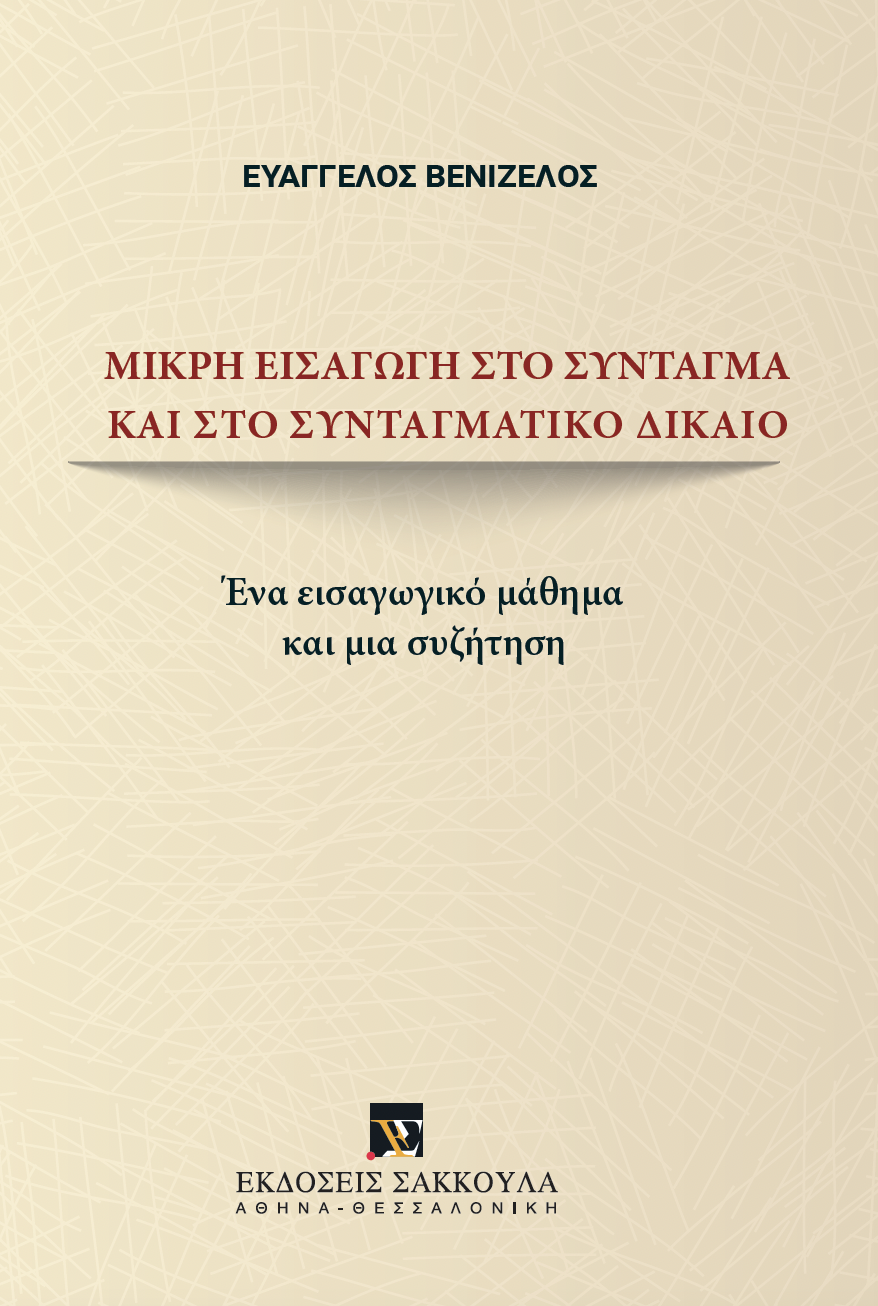Ευάγγελος Βενιζέλος, Γενική εισαγωγή στα άρθρα 4-25 Σ, σε: Ευάγγελος Βενιζέλος (επιστημονική διεύθυνση), Το Ελληνικό Σύνταγμα. Κατ’ άρθρο ερμηνεία. Τόμος I. Άρθρα 1-25, εκδόσεις Σάκκουλα, 2025, σελ 65 -301
Η ερμηνεία του Συντάγματος συνιστά ιδιαίτερη όψη της ερμηνείας του Δικαίου, καθώς πρόκειται για ερμηνεία κανόνων αυξημένης τυπικής ισχύος, οι οποίοι υπερέχουν έναντι των άλλων· κανόνων που συνήθως είναι ελλειπτικά ή πάντως λιτά διατυπωμένοι, με υψηλό βαθμό αφαίρεσης, που εμπεριέχουν πλήθος αόριστων και αξιολογικών εννοιών· κανόνων που διεκδικούν μακροχρόνια ισχύ και άρα αποσυνδέονται από τη συγκυρία και ως εκ τούτου διεκδικούν μια ιδιαίτερη σχέση με την ιστορία, καθώς είναι εκ καταγωγής έτοιμοι να υποδεχθούν πολλές, διαφορετικές καταστάσεις και κυρίως ρυθμίσεις που επιβάλλονται από τον κοινό νόμο.
Λαμβάνοντας υπόψη όλα τα ανωτέρω, το παρόν έργο μπορεί να χαρακτηριστεί ως η πιο μεθοδολογική και ευρύτερα επιστημολογική ερμηνεία του Συντάγματος. Στον παρόντα πρώτο τόμο περιλαμβάνονται τα άρθρα 1-25, δηλαδή κυρίως το πολίτευμα και η ύλη των θεμελιωδών (ατομικών και κοινωνικών κατά την ορολογία του Συντάγματος) δικαιωμάτων. Επίσης, περιλαμβάνεται «οριζόντιο» και εκτενές εισαγωγικό σχόλιο του Ευάγγελου Βενιζέλου στα θεμελιώδη δικαιώματα, που αναφέρεται στο σύνολο της ύλης των άρθρων 4-25 και επιχειρεί να ενημερώσει τον αναγνώστη που προστρέχει στην κατ’ άρθρον ερμηνεία για θέματα που διατρέχουν όλες τις διατάξεις.
Υπό τη διεύθυνση του Ευάγγελου Βενιζέλου στο συλλογικό αυτό έργο συμμετέχουν καταξιωμένοι νομικοί, εκλεκτοί δικαστικοί λειτουργοί και παλαιότερα και νέα μέλη της ακαδημαϊκής κοινότητας, συμβάλλοντας στη διαμόρφωση ενός πεδίου ανοιχτού διαλόγου για την ερμηνεία του Συντάγματος.
Evangelos Venizelos, ‘Du patrimoine à l’acquis constitutionnel’ in: Ch. Giannopoulos & L.-A. Sicilianos (dir), Le patrimoine constitutionnel européen entre progression et régression / The european constitutional heritage between progression and regression, Actes du colloque organisé par la Fondation Marangopoulos pour les Droits de l'Homme et l'Université de Strasbourg, 4 et 5 mai 2023, (Editions Pedone 2024) pp. 23-40 [PDF]
- Ευ. Βενιζέλος, Η σύνδεση της αρχής του κράτους δικαίου και της αρχής του κοινωνικού κράτους στο ελληνικό Σύνταγμα του 1975 μετά τις αναθεωρήσεις του 2001 και του 2019 υπό το φως των διδαγμάτων της οικονομικής κρίσης, σε: Ευ. Ρ. Σαχπεκίδου, Γ. Σταυρόπουλος, Π. Γκλαβίνης, Ι. Κτενίδης, Δ. Λέντζης (επιμ.), Δίκαιο και Πολιτική. Τιμητικός Τόμος για τον Πέτρο Στάγκο, εκδόσεις ΕΥΡΑΣΙΑ, 2023, σελ. 79- 100 [PDF] = Εφημερίδα Διοικητικού Δικαίου, τ. 3, 2023, σελ 266-278 [PDF]
Abstract
Evangelos Venizelos, 'The interrelation of the rule of law principle and the welfare state principle in the Greek Constitution of the 1975, following the amendments of 2001 and 2019, in the context of the lessons learned from the economic crisis', in: Law and Politics for a Europe of Democracy, the rule of law and fundamental rights. Festschrift for Petros Stagos, (editor EYRASIA 2023), p 79-100
The economic crisis has made the relationship of both judges and legislators with the Constitution and its regulatory content concerning social rights much more demanding. The national constituent power when called upon to regulate matters related to the welfare state, obviously has to take into consideration the country's participation in the EU and the Eurozone, as well as the legal obligations arising from that participation. Moreover, a new relationship between the national fiscal Constitution and the economic governance of the Eurozone has been shaped due to the economic crisis. In this context, should be placed the revision in 2019 of Article 21, paragraph 1 of the Greek constitution in order to introduce as sentence b the provision that "The State ensures the conditions for a decent standard of living for all citizens through a minimum guaranteed income system, as defined by law." However, after the experience of the crisis, these issues cannot be addressed through evasions or old theoretical approaches, such as the revival of the theory of constitutional guiding principles. These allow the national constituent power to express desires, make promises, or provide "guidance," leaving the legislator with the discretionary power to activate them or the political cost of not doing so, depending on the financial capabilities of funding social or developmental policies. Moreover, through the curve traced by case law and developed by theory in terms of the relative social acquis, the so-called constitutional guiding principles gradually acquired a regulatory content that could be pursued judicially. The question is how, by whom, and within which procedural framework the risk of fiscal derailment that can have extremely negative consequences on the value of human being and the level of their decent living should be taken into account.
Πρόλογος Ευ. Βενιζέλου στο Συνταγματικό Δίκαιο του Δ. Θ. Τσάτσου, τόμος Α΄, (επανέκδοση, Κέντρο Ευρωπαϊκού Συνταγματικού Δικαίου, 2022) [link]
*Για τους τόμους Α και Β δειτε εδω: https://www.epoliteia.gr/e-books/2022/11/23/syntagmatiko-dikaio-a-kai-b-tomos-dimitris-th-tsatsos/
-
Ευάγγελος Βενιζέλος, 'Η σχέση δικαίου και πολιτικής από τη νεωτερική στη μετανεωτερική εποχή', σε: τιμητικό Τόμο για την Πρόεδρο της Δημοκρατίας Κατερίνα Σακελλαροπούλου, «Το βιώσιμο Κράτος», Εκδόσεις Σάκκουλα, 2022, σ. 613-624 [link]
-
Προδημοσίευση: Εφημερίδα Διοικητικού Δικαίου (ΕφημΔΔ), Ανάτυπο Τεύχος 5/2021, σ. 578 - 583 [ PDF ]
- Evangelos Venizelos, From the relativization of the Constitution to the “augmented Constitution” , ERPL/REDP, vol. 32, no 3, autumn/automne 2020, pp 973-1017 [PDF]














